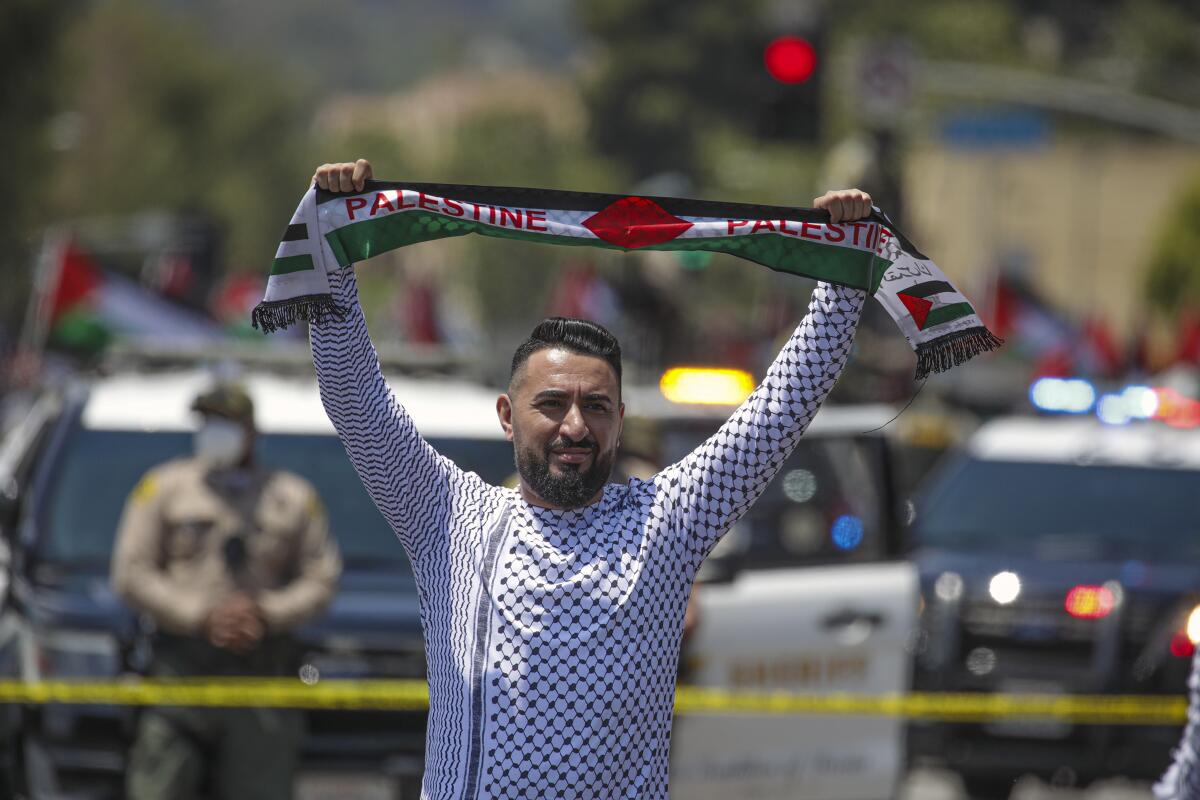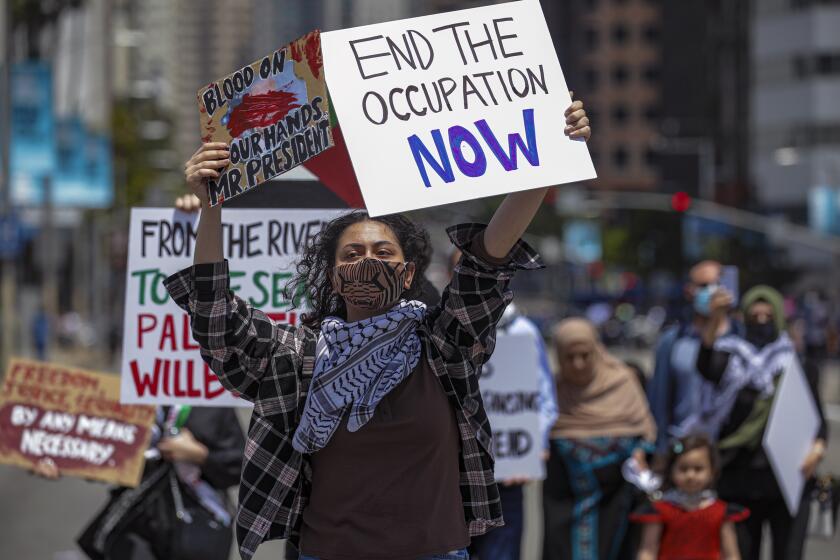Pro-Palestinian activists are building a broad progressive coalition in the U.S.

- Share via
The activists spoke from behind their computer screens, convening from multiple corners of the world to convey a singular message on the need for continued solidarity among Black organizers and their Palestinian counterparts.
“I know that Palestinian people have felt alone for so long, and I know that because Black people have felt alone for so long,” said Janaya “Future” Khan, a prominent Black Lives Matter activist. “We have to be together in this.”
The Zoom panel, co-hosted by the Dream Defenders — a Florida-based group that was launched in the wake of Trayvon Martin’s death — and titled “What does Palestine mean for Black America,” included well-known Black and Palestinian voices, including Angela Davis and Mohammed El-Kurd.
Black and Palestinian Americans, as well as Palestinians in the Middle East, share a common cause, Khan said. “My freedom is bound up with Palestinian people, and Palestinian people’s freedom is bound up with me.”
The world witnessed agonizing scenes of death and destruction in 11 days of fighting between Israel and the militant group Hamas, which controls the Gaza Strip, a Palestinian territory, before a cease-fire took effect last week. The fighting erupted amid fierce debate over plans for the forced displacement of several Palestinian families in Sheik Jarrah, a neighborhood in East Jerusalem.
As pro-Palestinian posts have spread across social media in recent days, Black, Armenian, liberal Jewish and other social justice organizers have helped Palestinians push their message both online and in the streets. That merger of groups and causes has reached a critical mass, its supporters say, in a way that differs from past episodes in the long-running Mideast conflict.
A shared purpose and political perspective has revealed itself in larger and more diverse pro-Palestinian demonstrations across the country, mounting pressure from progressive politicians on the Biden administration, and a shift in American political discourse about Israel in Washington, the U.S. media and other institutions.
“What happened recently is a little unprecedented,” said Omar Karim, a Palestinian American organizer in Los Angeles. “A lot of that has to do with coalition building and the intersectionality of politics that we have been seeing in the last few years — especially with the Mike Brown and George Floyd protests. Within other communities, that solidarity has been there too — the growing trend of Jewish youth in America helping to shift the conversation.”
Thousands of protesters gathered Saturday in Westwood to demonstrate support for Palestinians amid violence that’s claimed a spiraling casualty toll in Gaza and Israel.
Armenian Americans and Indigenous activists, he said, also make a connection between their communities’ struggles and those of the Palestinians.
“It’s not just in relation to Black lives movements — all these communities are coming together,” Karim said. Even the Sunrise Movement, a youth organization dedicated to combating climate change, released a statement in solidarity with Palestinians.
But others decry the analogies being drawn between apartheid South Africa and Israel, and rhetoric describing Israel as engaging in “settler colonialism.” Pro-Israel advocates argue that such comparisons are misleading and false. They say that public debate in the United States — historically, Israel’s staunchest ally — has swung too far in the opposite direction in a way that allows for criticism of Israel but doesn’t provide space to critique Hamas, which the U.S. government has designated a foreign terrorist organization.
“The charge of referring to Zionism as white supremacy is one of the most insidious attacks on the Jewish state,” said Siamak Kordestani, West Coast director of Friends of the European Leadership Network. “One of the reasons it’s so hypocritical and ignorant is that in the 1940s and 1950s, there were violent riots targeting Mizrahi Jews in countries like Iraq, Yemen and Syria. They fled to the state of Israel where they took refuge and were integrated as citizens.”
As an Iranian Jew, Kordestani said, he is disappointed that “they have been characterizing the conflict as one between white versus brown, when we know the majority of Jewish Israelis are descendants of Mizrahi Jews.”
The cease-fire at 2 a.m. Friday brought a halt to the worst bout of violence between Israelis and Palestinians since 2014.
Israeli airstrikes and artillery bombardment have killed 248 Palestinians in Gaza, including 66 children, according to the Health Ministry there. The more than 4,000 rockets that Hamas and other militants launched left 12 people dead in Israel, including two children.
As a result of the latest violence, criticism from the U.S. left has grown louder than in previous years, with forceful support for Palestinians reaching the floors of Congress.
Led by politicians such as Sen. Bernie Sanders (I-Vt.) and Reps. Alexandria Ocasio-Cortez (D-N.Y.) and Rashida Tlaib (D-Mich.), the progressive bloc has publicly lobbied President Biden to break with Israeli Prime Minister Benjamin Netanyahu and pushed for blocking the sale of $735 million in precision-guided bombs to the Israelis.
“Palestinians are being told the same thing as Black folks in America: There is no acceptable form of resistance,” Rep. Ayanna Pressley (D-Mass.), who is Black, said in a speech this month.
Michael Fischbach, author of “Black Power and Palestine: Transnational Countries of Color,” said the Black Lives Matter movement has played a key role in intersectional support for Palestinians because it “not only mobilized young people of color and their allies, but it also rekindled the old spirit of mass public demonstrations and protests on an ongoing level.”
The sense of solidarity among many in the two communities is “nothing new,” he said. Its origins date at least to the 1960s, when groups such as the Student Nonviolent Coordinating Committee and the Black Panther Party expressed public support for the Palestinian cause.
“People tend to forget about it, but Muhammad Ali visited Lebanon in 1974, railed against Zionism and visited a Palestinian refugee camp in Lebanon,” Fischbach said. “Into the early 1980s, even Black Christian ministers and organizations were aware of the connections — it was no longer simply Black power radicals of the ’60s.”
More recently, he said, Black-Palestinian commonality can be traced to the protests in Ferguson, Mo., in 2014, when Palestinian activists were sending tweets to protesters, saying “this is how you deal with tear gas, this is what you’ve got to do, this is how you run away down an alley.”
But not all progressives see support for Palestinians as central to their platform. Rep. Ritchie Torres (D-N.Y.), who is Black, describes himself as a “pro-Israel progressive.” He recently affirmed his “unwavering commitment to both the sovereignty and security of Israel as a Jewish state.”
The share of Americans who say their sympathies lie primarily with the Palestinians has grown from roughly 1 in 7 during most of the first decade of this century to about 1 in 4 today, according to a March Gallup poll. The share of Americans who say their sympathies lie mostly with Israel has remained stable, at roughly 6 in 10, while the number who say they’re neutral or don’t have an opinion has declined.
“There are other voices out there and those protests don’t necessarily represent the entire conversation across all kinds of communities in L.A. and beyond,” Kordestani, 35, said. “But that doesn’t mean there can’t be criticism of the Israeli government.”
Pro-Palestinian rallies in L.A. over the last several days have been largely peaceful, according to officials. On May 18, demonstrators met outside the Israeli Consulate in L.A., and over the weekend thousands of protesters gathered in Westwood to show support for Palestinians.
Thursday afternoon, Los Angeles public officials and interfaith leaders met outside City Hall to condemn recent attacks against Jewish residents that coincided with the attacks in Israel and Gaza. The Los Angeles Police Department is investigating a May 18 attack on diners outside a Westside sushi restaurant Tuesday as an antisemitic hate crime.
An attack on diners outside a sushi restaurant by people shouting slogans against Israel is being investigated by Los Angeles police as an antisemitic hate crime.
Palestinian supporters and organizations such as the Muslim Public Affairs Council have also spoken out against the attacks targeting the Jewish community, saying that those who perpetuate such violence do not represent their cause.
To Diyala Shihadih, a Palestinian American organizer and graduate student in Northern California, the increasingly vocal support for Palestinians represents the culmination of years of organizing.
“I do think we have very much learned from each other, and in the learning built deeper connections,” said Shihadih, 27. “The broadening of our campaign, the intersectionality that we are seeing, the way people have shown up for the Palestinian people has increased our microphone and made it louder.”
Coordinated social media campaigns have played a “huge role,” she added, allowing Palestinians on the ground to immediately post their experiences.
“As a movement, we are sharing who is going live. With Instagram’s new function you can bring multiple people into a live[stream], letting people on the ground speak, leveraging the platform to amplify the voices of Palestinians,” she said. “It’s important to the freedom of information.”
Morriah Kaplan, national spokesperson for the progressive Jewish activist group IfNotNow, said that she has noticed a difference in “the way Jewish people are showing up in this moment versus 2014.”
“There is a much broader range of opinions on Israel than leadership of our community would suggest,” she said.
Leah Platkin moved back to California from Israel with her husband, a Palestinian citizen of Israel, in 2019. She wasn’t able to attend the large pro-Palestinian protest in Los Angeles last week, she said, but her parents attended and told her about the thousands who had gathered.
“I was floored. I had more protest FOMO than I have ever had,” said Platkin, 37, referring to the fear of missing out. “My mom was like, ‘It’s all young people’ and I think that is something that is really different.”
Platkin, a social worker who did trauma work with asylum seekers from Eritrea and Sudan as well as with Palestinian women and youths in Israel, believes that “supporting human rights for Palestinians is not antisemitic.”
“This idea of two sides, it’s kind of like ‘all lives matter.’ I don’t feel like giving Palestinians land rights is a threat to my identity as a Jew,” she said.
Karim, the organizer, said the growing coalition gives him a sense of hope.
“Solidarity is never transactional,” he said. “You do it because it is the right thing to do.”
Times staff writer David Lauter in Washington contributed to this report.
More to Read
Sign up for Essential California
The most important California stories and recommendations in your inbox every morning.
You may occasionally receive promotional content from the Los Angeles Times.















